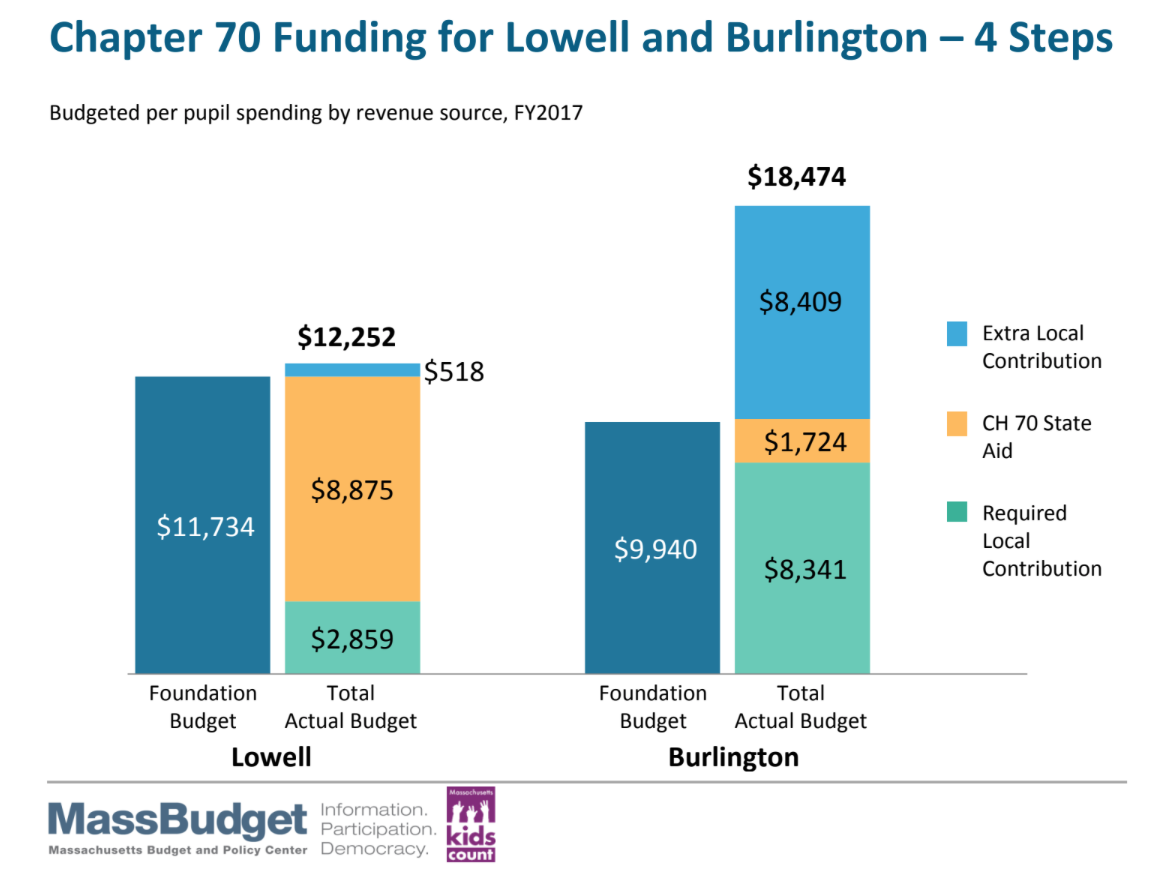It seems pretty clear to me
 About two weeks ago, the Massachusetts Legislature failed once again to update school funding formulae known as the "Foundation". In my opinion, this is not only a huge disappointment, it is a disservice to students, families, and public schools in 351 cities and towns across Massachusetts.Here in Lowell, the erosion of school services and supports can be traced in the budget cuts that have been necessary over the last nearly 20 years. In the late 1990s, when an elementary class size reached 25, it was common practice to assign a paraprofessional to that classroom, which allowed for more focused and individualized attention to students. In 2015, my retirement year, my grade level of 100 students and 4 classroom teachers shared 1 paraprofessional.In the 1990s and early 2000s, elementary school staff included not only a library aide, but a certified Library Media Specialist. The library was a space where students not only learned research skills, but were exposed to wonderfully diverse literature and media curated by the Library Media staff. By the mid-2000s, all but one Library Media specialist was cut from the Lowell Public Schools and school libraries were maintained by Library Media aides. This year, 2018-19, the school budget has cut all library staff in Grades Kindergarten through Grade 8 essentially closing the libraries to any students below Grade 9.These are but two examples of service cuts in Lowell. There have been many others. Teachers in Lowell spend inordinate amounts of personal money (in my own case, I spent on average of $1,000 each year and some years much more) to supply classrooms. Social workers, Speech and Language therapists, OT, PT, Special Education.... all carry larger-than-reasonable caseloads.Have municipalities like Burlington or Wellesley cut K-8 library staff and access to school libraries? Of course not. Wealthier communities make up the shortfalls in Foundation funding from their property tax base and a community that is able to afford to allocate more funds toward schools. Does that seem equitable to anyone? (read WBUR's commentary Inaction on School Funding Will Keep Opportunity Gaps in Place.)What does our Commonwealth say about our schools and the Commonwealth's responsibility to fund education? We only need to look at the Commonwealth's Constitution and this paragraph:
About two weeks ago, the Massachusetts Legislature failed once again to update school funding formulae known as the "Foundation". In my opinion, this is not only a huge disappointment, it is a disservice to students, families, and public schools in 351 cities and towns across Massachusetts.Here in Lowell, the erosion of school services and supports can be traced in the budget cuts that have been necessary over the last nearly 20 years. In the late 1990s, when an elementary class size reached 25, it was common practice to assign a paraprofessional to that classroom, which allowed for more focused and individualized attention to students. In 2015, my retirement year, my grade level of 100 students and 4 classroom teachers shared 1 paraprofessional.In the 1990s and early 2000s, elementary school staff included not only a library aide, but a certified Library Media Specialist. The library was a space where students not only learned research skills, but were exposed to wonderfully diverse literature and media curated by the Library Media staff. By the mid-2000s, all but one Library Media specialist was cut from the Lowell Public Schools and school libraries were maintained by Library Media aides. This year, 2018-19, the school budget has cut all library staff in Grades Kindergarten through Grade 8 essentially closing the libraries to any students below Grade 9.These are but two examples of service cuts in Lowell. There have been many others. Teachers in Lowell spend inordinate amounts of personal money (in my own case, I spent on average of $1,000 each year and some years much more) to supply classrooms. Social workers, Speech and Language therapists, OT, PT, Special Education.... all carry larger-than-reasonable caseloads.Have municipalities like Burlington or Wellesley cut K-8 library staff and access to school libraries? Of course not. Wealthier communities make up the shortfalls in Foundation funding from their property tax base and a community that is able to afford to allocate more funds toward schools. Does that seem equitable to anyone? (read WBUR's commentary Inaction on School Funding Will Keep Opportunity Gaps in Place.)What does our Commonwealth say about our schools and the Commonwealth's responsibility to fund education? We only need to look at the Commonwealth's Constitution and this paragraph:
“Wisdom, and knowledge, as well as virtue, diffused generally among the body of the people, being necessary for the preservation of their rights and liberties; and as these depend on spreading the opportunities and advantages of education in the various parts of the country, and among the different orders of the people, it shall be the duty of legislatures and magistrates, in all future periods of this commonwealth, to cherish the interests of literature and the sciences, and all seminaries of them, especially the university at Cambridge [and] public schools and grammar schools in the towns….” Mass. Const. Pt. 2, C. 5, § 2.
As of this writing, the Legislature has failed our schools and our children. They have failed in their duties to "cherish" education and they have failed to provide the funding that would allow ALL public schools across Massachusetts to provide equitable educational opportunities.We must tell our narratives as parents, students, educators, and community members. We must let our legislators know in no uncertain terms, that to continue to underfund the Foundation Budget Review Commission's recommendations is unacceptable. We need to cherish our schools here in Massachusetts and fix the funding so that every child has access to equitable educational opportunities.